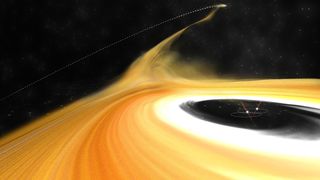
About a billion years from now, the sun will have become much bigger, brighter and hotter, likely leaving Earth uninhabitable. However, a chance encounter with a passing star could save our planet by tossing it into a cooler orbit or helping it break free of the solar system entirely, a new theoretical study suggests. (Still, the chances of that happening are extremely slim.)
Today, Earth lies within the sun's habitable zone, a ring-shaped region within which planets may harbor liquid water. But our planet's situation will worsen as the sun grows over the next billion years, pushing this zone outward and away from Earth. That means liquid water — and, therefore, life — could become history well before the sun balloons into a red giant and swallows Earth entirely 5 billion years from now.
But what if Earth were ejected from its orbit to become a free-floating, "rogue" planet? To investigate this possibility, a team of astronomers simulated how our solar system would behave if a star swept past it at some point in the next billion years — an event they knew could kick planets out of orbit. Their study has been accepted for publication in the journal Monthly Notices of the Royal Astronomical Society and is available in the preprint database arXiv.
Related: 'Rogue' star hurtling through the Milky Way won't smash into our solar system after all
Stellar flybys of this kind have happened in the past.
"Currently, the closest approach of any star is about 10,000 au [astronomical units] (and happened a couple million years ago)," lead study author Sean Raymond, an astronomer at the University of Bordeaux in France, told Live Science by email. That's 10,000 times the distance from Earth to the sun. But just to see what would happen, the team calculated planetary movements when stars of different sizes approached at various distances, even as close as 1 au.
The researchers produced 12,000 simulations. In some of them, the star's passage pushed Earth into a farther, colder orbit. In others, our planet (along with some or all of the other planets) landed in the Oort cloud, the spherical shell of icy objects believed to sit at the outermost edge of the solar system.
More intriguingly, in a handful of simulations, the wandering star managed to gravitationally lure Earth away with it, capturing our planet in its free-wheeling orbit through the cosmos. According to Raymond, Earth, in this case, "could in principle end up on an orbit receiving enough energy for liquid water" from our new home star.
Still, it's best not to put your money on a stellar savior. All these possibilities together amount to just a 1-in-35,000 chance that life on Earth will survive after the star whirs by, the researchers found. As Raymond noted in his blog PlanetPlanet, that's roughly the odds of "randomly pulling the ace of spades from two separate decks of cards while also rolling a combined 10 with two dice. Not the best odds."
Rather than hoping for a star to save Earth from its inevitable doom, Raymond suggested "coming up with a solution ourselves, either by modifying Earth's orbit or blocking a fraction of the Sun's incoming energy."
Some of the other simulations had even worse results for our solar system, with planets, including our own, colliding with one another or with the sun. For example, Mercury frequently met a fiery end.
Yet, even these outcomes are unlikely. More than 90% of the simulations showed no change in the orbits of any solar system planets. On the whole, then, the passing star would have little impact on our neighborhood — for better or for worse.
Live Science newsletter
Stay up to date on the latest science news by signing up for our Essentials newsletter.

Abha Jain is a freelance science writer. She did a masters degree in biology, specializing in neuroscience, from the Indian Institute of Science, Bengaluru, India, and is almost through with a bachelor's degree in archaeology from the University of Leicester, UK. She's also a self-taught space enthusiast, and so loves writing about topics in astronomy, archaeology and neuroscience.
Most Popular

By Emma Bryce
